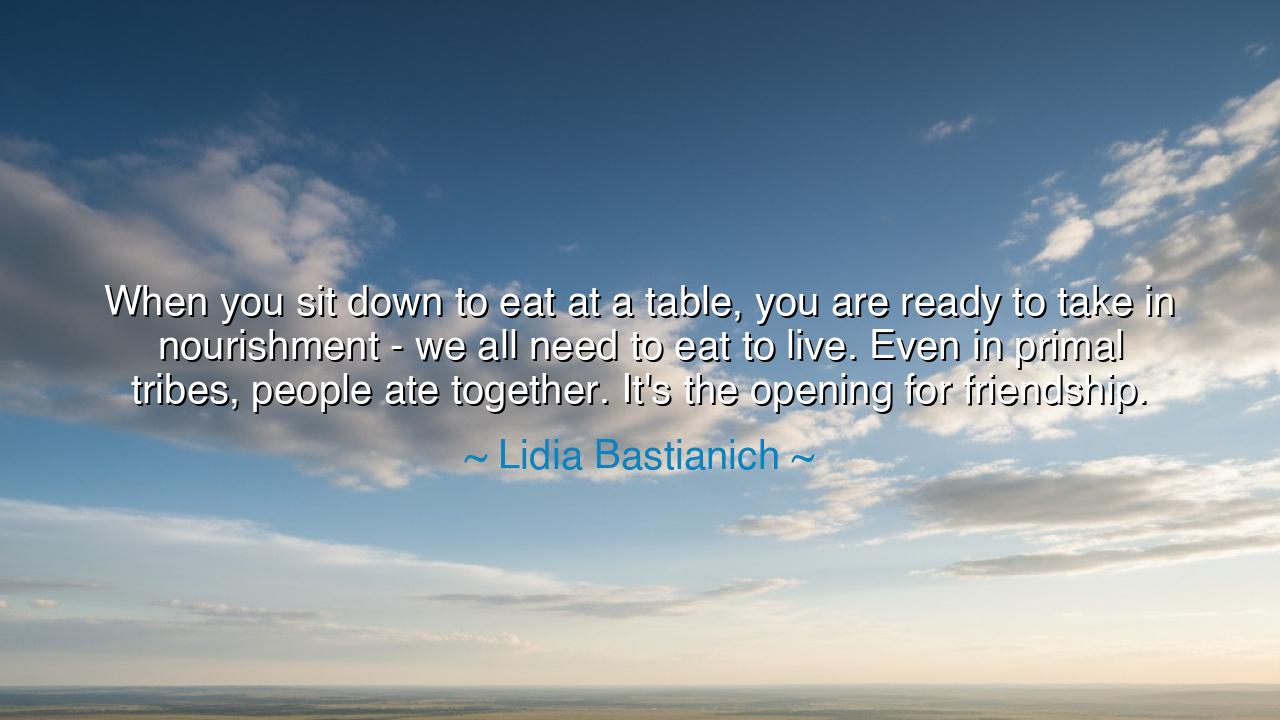
When you sit down to eat at a table, you are ready to take in
When you sit down to eat at a table, you are ready to take in nourishment - we all need to eat to live. Even in primal tribes, people ate together. It's the opening for friendship.






In the heartfelt words of Lidia Bastianich, a woman who has nourished both body and soul through her craft, we find a truth as old as humanity itself: “When you sit down to eat at a table, you are ready to take in nourishment — we all need to eat to live. Even in primal tribes, people ate together. It’s the opening for friendship.” These words, though spoken in the language of food, speak to something far greater — to the sacred power of sharing, to the act of breaking bread as the first bridge between souls. For when we sit at a table together, we are not merely feeding the flesh; we are feeding the heart, the memory, and the invisible bond that makes strangers kin.
In every age and every land, the table has been a place of unity. The ancients understood that to eat with another was to enter a silent covenant of peace. Among the Greeks, the sharing of bread and salt symbolized trust; to betray one who had eaten at your table was an act so vile it defied the gods themselves. The Romans, though fierce in battle, laid down their swords when invited to dine, for the table was holy ground. Even among the most distant tribes and nomads of the earth, eating together marked the beginning of kinship — a primal acknowledgment that though our tongues differ, our hunger is the same. In this way, Bastianich’s words awaken us to a truth forgotten by the hurried world: that friendship begins not in grand speeches, but in the humble act of sitting side by side, sharing sustenance, and acknowledging our shared need to live.
The origin of this wisdom is not found in philosophy but in life itself. Bastianich, a chef and storyteller, has spent her years turning food into communion. For her, the kitchen is not merely a place of creation but of connection — where every meal is a gift and every table a sanctuary. Her words recall her own journey, from a childhood shaped by hardship to a career defined by hospitality. Having lived through war, exile, and the rebuilding of life in a new land, she understood that nourishment was more than survival; it was belonging. To cook and to eat with others was to affirm that, no matter the differences of culture or tongue, all human hearts are drawn to warmth, to flavor, and to fellowship.
Indeed, history bears witness to her truth. In ancient Mesopotamia, kings and laborers alike shared feasts as signs of peace. Among the Israelites, covenant meals sealed bonds of faith. And in the time of Christ, the act of breaking bread became the symbol of divine friendship itself — a reminder that to eat together is to recognize one another as human, as sacred, as family. Across time, the table has been the most enduring altar, where enemies are reconciled, lovers are joined, and wanderers find rest. Bastianich’s insight is not new, but timeless — the kind of wisdom that dwells not in books, but in every heart that has ever found solace in company and in the simple miracle of a shared meal.
Consider the tale of Abraham, the patriarch of three faiths. When strangers appeared at his tent in the desert, he did not question them, nor ask their origin. He slaughtered a calf, baked bread, and set a feast before them. In serving them, he unknowingly entertained angels. So it is with us: when we open our table, we open our hearts to grace. In feeding others, we nourish not only them but ourselves — for kindness, once offered, multiplies like bread broken among friends.
At the heart of Bastianich’s words lies an invitation — to slow down, to gather, and to remember what the modern world often forgets. In an age of speed and solitude, we eat alone, distracted and restless, our food consumed but not shared. Yet in doing so, we lose the ancient rhythm of community. The wise know that a shared meal is the foundation of understanding. It softens pride, disarms suspicion, and gives birth to friendship. To eat with another is to see them not as a rival, but as a fellow traveler, equally fragile, equally human.
So let this truth guide you: treat every table as sacred ground. When you sit to eat, do not rush; look upon those beside you and give thanks. Invite others to your table — not only family and friends, but those who hunger for connection. Listen as much as you chew; let conversation season the meal as much as salt. For as Bastianich teaches, it is not only the food that nourishes us, but the fellowship it brings forth. In every act of shared eating, you affirm life — not only your own, but the life of your community, your lineage, your species.
Thus, dear listener, remember: the meal is not merely a pause between labors; it is a celebration of existence. Whether in a palace or a hut, whether with kings or shepherds, when you sit to eat with others, you are partaking in humanity’s oldest ritual — the ritual of friendship. Guard it, honor it, and share it freely. For at the table, as Bastianich reminds us, we are reminded of our greatest truth — that we all hunger, we all need, and we are all bound together by the sacred act of nourishment.






AAdministratorAdministrator
Welcome, honored guests. Please leave a comment, we will respond soon